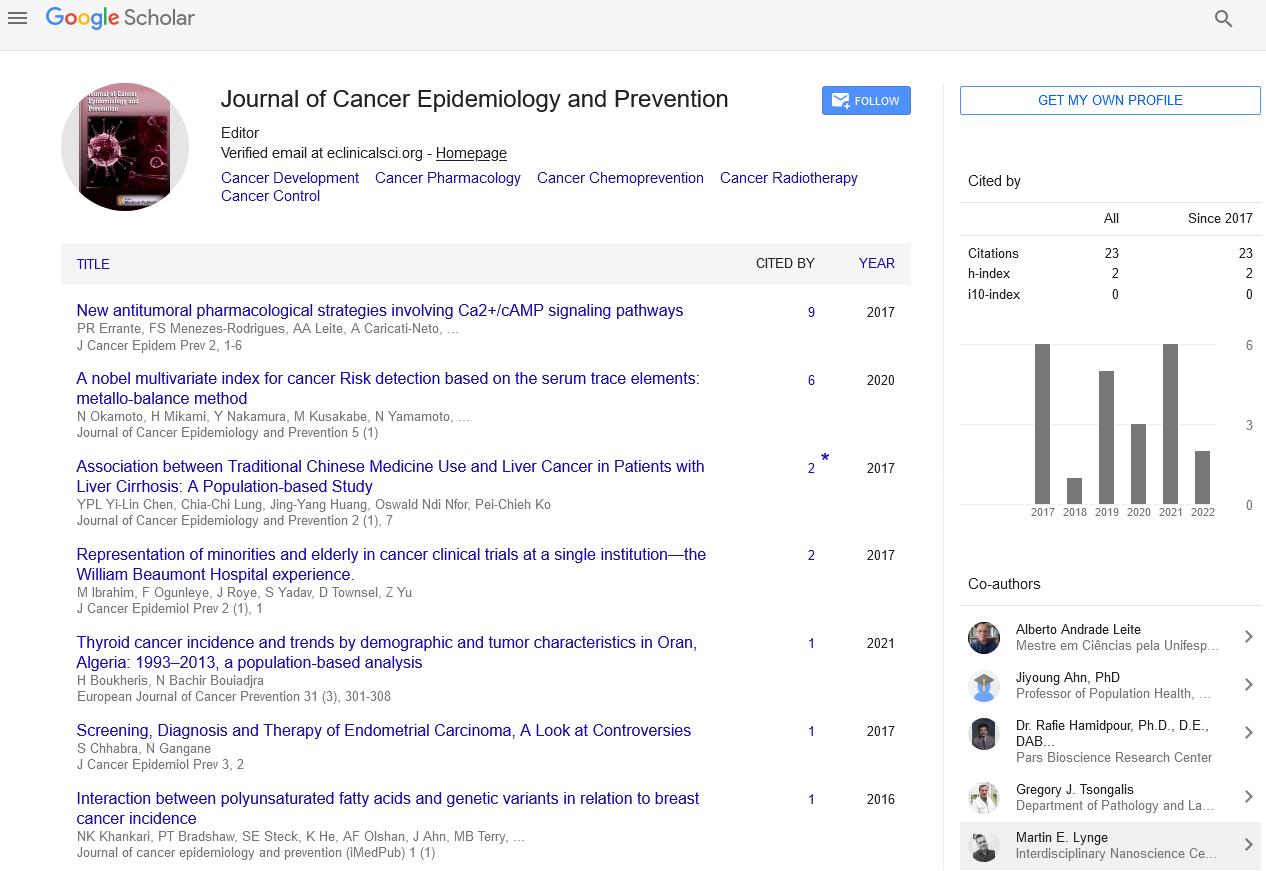Perspective - (2023) Volume 8, Issue 2
The KRAS Mutations in Colorectal Cancer: A Genetic Analysis
Robin Adam*
Department of Pathology, University of Pennsylvania, Pennsylvania, USA
*Correspondence:
Robin Adam, Department of Pathology, University of Pennsylvania, Pennsylvania,
USA,
Email:
Received: 27-May-2023, Manuscript No. IPJCEP-23-17707;
Editor assigned: 01-Jun-2023, Pre QC No. IPJCEP-23-17707 (PQ);
Reviewed: 15-Jun-2023, QC No. IPJCEP-23-17707;
Revised: 07-Sep-2023, Manuscript No. IPJCEP-23-17707 (R);
Published:
05-Oct-2023, DOI: 10.36648/IPJCEP.23.08.015
Introduction
Colorectal Cancer (CRC) occurrence is increasing, even though
there have been tremendous improvements in the diagnosis
and treatment. The process of developing cancer is typically
thought as a series of stages beginning with a mutagenic
incident known as tumour development. The adenomacarcinoma
sequence is regarded as a classic example of
spontaneous colon cancer in colorectal cancer. Numerous
signal transduction pathways, including the Wnt/-catenin
signalling cascade, the apoptotic signalling cascade, and
Mitogen-Activated Protein Kinase (MAPK), are implicated in
this process. It turned out that the conventional adenomacarcinoma
sequence's beginning cause was an APC gene
mutation. Due to the absence of Wnt signaling's inhibitory
effect in cells with mutant APC genes, -catenin accumulates
and, after being translocated into the nucleus, functions as a
co-activator of T-Cell Factor (TCF)-Lymphocyte Enhancer
Factor (LEF).
Description
The important cell cycle regulating genes cyclin D1 and c-Myc
are transcriptionally activated by the -catenin/TCF-LEF
complex, which in turn promotes tumour development. In this
case, APC suppression controls the development of adenomas
in the colon (i.e., gut), which are subsequently stimulated to
develop into colon malignancies in the presence of other
mutations, such as those in the TP53 and KRAS genes. By
using a combination of DNA hybridization tests and tissue
sectioning techniques shows that over one-third of human
colorectal tumours contained RAS gene mutations, and that
the mutations typically occurred before the beginning of
malignancy. Further studies showed that the frequency of
KRAS mutations varied from 25% to 52% and that they were generally found at codons 12 and 13, in exon 2, of the KRAS
gene's coding area. The glycine residues in the GTP-binding
pocket, which are essential for GTPase function, are affected
by single base changes in codons 12 and 13. As a result, these
KRAS mutations stabilise the protein in its prolonged active
state, increasing the signalling pathways downstream. The
MAPK and AKT pathways, which enable tumour cells to
multiply in the absence of growth stimuli and lengthen their
survival, are the two key downstream signalling pathways. In
addition, KRAS can control the production of the gene for
Vascular Endothelial Growth Factor (VEGF), increase Wnt
signalling by inhibiting GSK-3beta, and advance tumour
growth by collaborating with Wnt signalling.
KRAS not only plays a significant role in the development and
progression of colorectal cancer, but it also has an impact on
how it is treated. In patients with colorectal cancer, KRAS gene
mutations are significant predictors of response to cetuximab
or panitumumab therapy. Cetuximab and panitumumab are
not effective in patients with mutant KRAS, but are effective
in those with wild-type KRAS. While this was going on, some
studies claimed that the KRAS mutation was a poor predictor
of Overall Survival (OS) and Recurrence-Free Survival (RFS).
Conclusion
Although it is clear that KRAS is crucial for both the treatment
of patients with colorectal cancer and the carcinogenesis of
colorectal epithelial cells, KRAS mutations are, only identified
in 50% of patients. In other words, the wild type is present in
about 50% of cases. It is possible that people who have
mutant or wild-type KRAS will exhibit various biological traits
due to their different gene mutation spectra. In order to
better understand the occurrence, progression, and therapy
of colorectal cancer, studies may find it useful to compare
thegene mutation profiles of patients with and without a KRAS
mutation.
Citation: Adam R (2023) The KRAS Mutations in Colorectal Cancer: A Genetic Analysis. J Cancer Epidemiol Prev. 08:015.
Copyright: © 2023 Adam R. This is an open-access article distributed under the terms of the Creative Commons
Attribution License, which permits unrestricted use, distribution, and reproduction in any medium, provided the original
author and source are credited.

